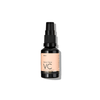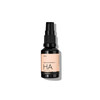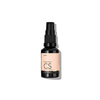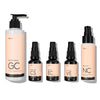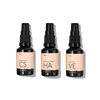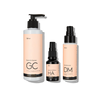The Importance of Incorporating SPF Into Your Skin Care
Sunscreen, also known as SPF, is most often thought of as only something you need to use when you are going to spend the day at the beach or a pool or going on vacation. However, it is incredibly important to use SPF on your face every single day. Most people don’t realize that, just because you aren’t on the beach in blistering sunshine, you can still get sun damage on your face simply by going about your day to day routine.

What is SPF?
SPF stands for ‘sun protection factor’ and is a measure of a skincare product's ability to protect you from the sun’s harmful ultraviolet (UV) rays. For example, a sunscreen with an SPF of 50 means that it would take you 50 times longer to burn wearing that product opposed to no sun protection. UV light is invisible to the human eye as the rays are shorter wavelengths than the light we can see. There are two types of UV radiation that pose a threat to keeping our skin ageless and healthy. UVA are longer rays that penetrate deep into the dermis (deeper layer) of our skin and play the role that causes tanning and premature ageing. UVB are shorter rays that can develop skin cancer long-term, with short-term effects showing superficial damage to the epidermis (surface layer) of our skin with long exposure. ‘Broad spectrum’ is the ideal type of SPF to protect our skin as it provides protection for both UVA and UVB rays. The World Health Organisation recommends an SPF of at least 15 to protect our skin. In recent years, many skin care companies have created innovative product formulas that are absent of any residual shine or stickiness after application, to help their customers protect their skin from these harmful rays. These products can actually be created using physical or chemical formulas, with both being effective, however, chemical sunscreens have a higher chance of producing skin irritation. Common ingredients that you will find in physical sunscreens are titanium dioxide and zinc dioxide which provide a physical barrier against UV rays, whereas chemical sunscreens contain chemicals which protect the skin through absorbing UV energy.
What Happens To Your Skin If You Don’t Wear SPF
Why Your Skin Needs TLC
There is a difference between the skin on your face and the skin on the rest of your body. As it turns out, your facial skin is much more sensitive and susceptible to damage, for a couple of different reasons. These are that your face is far more exposed to the sunlight than the rest of your body; your facial skin is actually thinner; and it is much more vulnerable to hormonal damage, dirt, bacteria, and general wear and tear. This means that you need to take better care of your face than the rest of your skin.
Science Behind Sun Damage
Apart from potentially causing skin cancer, forgetting to wear SPF on your body and face can have detrimental effects to your skin. Sun damage begins with a process known as ‘photo-aging’, which is triggered through chronic unprotected UV exposure or intermittent excessive sun exposure such as ‘sunburn’ . Photoaging prompts the skin to protect itself by producing more melanin, creating a ‘tan’.
Visible Effects of Sun Damage
As a result of this process oxidative stress is caused by the sun, leading to the breakdown of collagen and connective tissue which reduces skin elasticity and can lead to wrinkles and sagging of the skin. The sun can also cause solar lentigines more commonly known as ‘age spots’, which develop as a result of hyperpigmentation. Wearing no SPF can also increase your risk of scarring where existing marks can be exacerbated from UV rays. Sun damage can also increase the risk of developing telangiectasias (broken blood capillaries) visible as red or purple spidery looking clusters of veins.
Skin Care Ingredients That Can Increase Sun Damage
It is also important to be informed of skin care ingredients that can increase your sensitivity to the sun, for example chemical ingredients such as acid and retinol and some photosensitive essential oils (if their concentration is above 0.1%) can increase your chance of irritation so it is highly recommended to use SPF when using skin care ingredients like these.
When Do You Need to Wear SPF?
Wearing SPF throughout the day is a year-round commitment and is essential to prevent visible signs of ageing, where 75% of ageing is due to environmental factors, most particularly UV rays. It is really important that you don’t become complacent with SPF as UV radiation can penetrate glass and clouds and are still present on overcast or colder days. Additionally, if you wear SPF on a hot day in the sun make sure to keep reapplying every two hours and wear shade wear. Applying SPF once in the day outdoors is not enough to keep you sufficiently protected and you can develop a lot more UV damage from applying once and staying out in the sun for an excessive amount of time.
How To Incorporate SPF Into Your Skin Care Routine
So I think it is clear to you now, that SPF is an absolute must, but how do you incorporate sunscreen into your skin care routine? There are many ways to do this due to diverse formulas that offer individual face sunscreens in addition to other skin care products that contain SPF within their product. Due to this large offering, Feather Beauty will help you narrow down your search for the perfect SPF skin care product for you.
What Is The Best SPF For Me?
The level of SPF you require will depend on your skin tone, where lighter skin requires 30-50+ SPF and darker skin tones requiring 15-30+ SPF. If you fall somewhere between the middle, the best SPF is usually 30+ which is suitable for almost all skin types. If you have sensitive or oily skin opt for an oil-free SPF product. A sunscreen designed for your face is unlikely to cause breakouts and you can check out their ingredients lists to make sure they don’t contain any nasties that will irritate your skin (check out our article on 5 Skincare Ingredients Fetherettes Should Avoid).
When Do I Apply SPF?
The easiest way to incorporate SPF into your skin care routine is after you apply your moisturiser if it doesn’t already include SPF, applying it generously to your face, neck and chest. After you apply your SPF, you can start putting on your makeup. If you don’t wear makeup, some SPF formulas include a mattifying formula that gives a really nice glowing effect to the skin, without making you look oily. This may be enough if you are indoors all day, but if you spend a lot of time outdoors, especially in Spring or Summer you will need to reapply this SPF every 2 hours in order for it to have effective protection. To reapply over makeup there are some very innovative products out there such as tinted moisturisers, loose powders and setting sprays that contain SPF factors in them, allowing you to lock in your makeup and reapply SPF at the same time. If you have an active lifestyle or are on holiday by the beach or pool it is recommended to find a water resistant SPF to maintain uninterrupted protection from UV rays.
After understanding the importance of protecting your skin from the sun, don’t forget about other areas such as your lips and hands that will show ageing just as easily as your face! Incorporating SPF into your skin routine will quickly become second nature when you realise just how important it is to achieve ageless and glowing skin.
